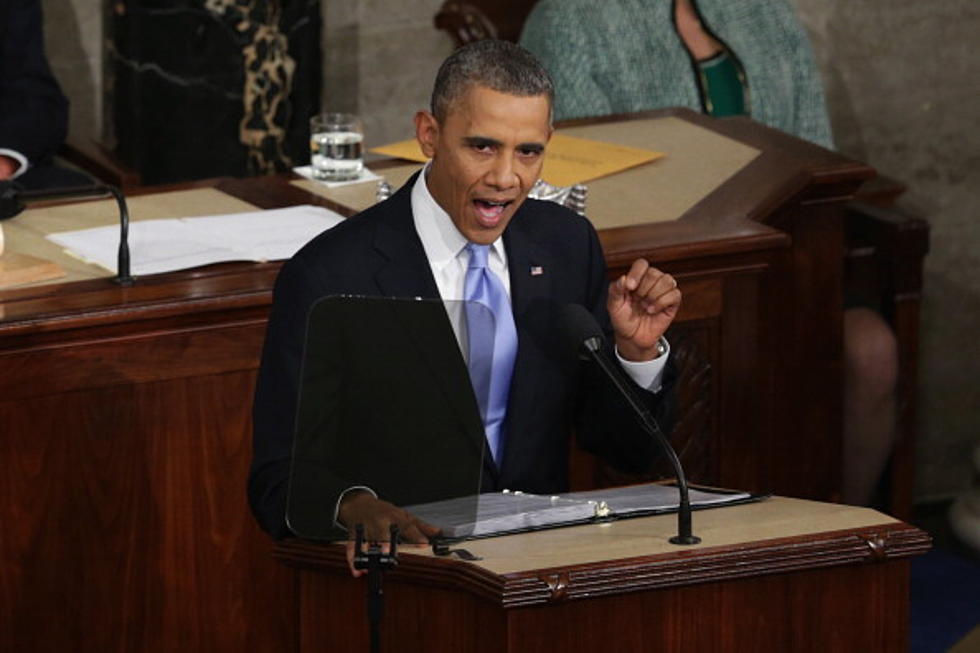
Chad’s Morning Brief: Obama to Drop Entitlement Cuts From Budget, the FCC Wants in the Newsroom, and Other Top Stories
Here is your Morning Brief for the morning of February 21, 2014. Give me your feedback below and tune in to The Chad Hasty Show for these and many more topics from 8:30 to 11am. Remember, you can listen online at KFYO.com or on your iPhone/Android with the radioPup App.
Entitlement Cuts Dropped
If you thought the White House was ready to cut entitlements, you were wrong. Moderate Republican's, I'm talking to you. According to POLITICO, since Republicans don't want to raise taxes, President Obama is done pretending that he'd cut entitlements.
President Barack Obama is done pretending that he’ll get any new budget cooperation from House Republicans.
His proposed 2015 budget, due to be released next month, will stick to the economic strategy the White House has laid out without the compromise suggestion he floated last year, White House officials said Thursday.
Gone, the White House said, is Obama’s proposal for chained CPI — an offer to reduce the the benefit increases for Social Security and other federal social programs.
Instead, the budget will hew to traditional Democratic priorities, presenting how Obama would fund the government if he controlled all the levers of power, said White House spokesman Josh Earnest.
The White House blamed House Republicans for refusing to entertain raising tax revenue in exchange for including chained CPI — but added that Obama’s offer to do just that remains on the table, as part of the negotiating process.
Obama’s 2015 budget proposal comes about as Democrats and Republicans are operating under a two-year bipartisan spending agreement reached in December by Sen. Patty Murray (D-Wash.) and Rep. Paul Ryan (R-Wis.), the leaders of the Senate and House budget committees. The budget proposal will adhere to the Murray-Ryan spending limits, the White House said.
The White House expressed disappointment — though not surprise — that Republicans wouldn’t consider tax revenue increases, then or now.
“Unfortunately, Republicans refused to even consider the possibility of raising some revenue,” Earnest said. “That is an unfortunate policy choice that Republicans themselves have made.”
The budget proposal will include $56 billion for Obama’s Opportunity, Growth, and Security Initiative which would, among other things, a new Race to the Top education initiative, the manufacturing institutes Obama has called for in his last two State of the Union addresses and universal pre-kindergarten.
The White House budget is, as Earnest said, a political document that represents how a president “in an ideal world believes the government should be funded.” The budget Obama proposed last year fizzled nearly as soon as it was presented. The largest new revenue stream the White House pitched — $78 billion in new taxes on tobacco to fund education programs — never got traction in Congress and was largely forgotten.
Speaker John Boehner (R-Ohio) called Obama’s budget stance as a “non-starter” in the House.
“This reaffirms what has become all too apparent: the president has no interest in doing anything, even modest, to address our looming debt crisis,” Boehner spokesman Brendan Buck said Thursday. “The one and only idea the president has to offer is even more job-destroying tax hikes, and that non-starter won’t do anything to save the entitlement programs that are critical to so many Americans. With three years left in office, it seems the president is already throwing in the towel.”
Leading congressional Democrats hailed Obama’s budget announcement with statements that seemed to offer a subtle and retroactive criticism to last year’s chained CPI proposal.
Senate Majority Leader Harry Reid (D-Nev.) called the budget proposal “a powerful statement of Democratic principles.”
“I commend President Obama for his commitment to keeping Social Security strong, and for rejecting Republican calls to cut badly-needed cost of living increases,” Reid said.
And House Minority Whip Steny Hoyer (D-Md.) said the rest of the Democratic agenda will serve as an economic boost.
“We will promote budget savings that do not come at the expense of the most vulnerable in our society,” Hoyer said. “Enacting policies that improve our economy while helping stabilize our debt over the long term, like comprehensive immigration reform, can allow us to invest further in a stronger economy.”
Obama’s move to abandon chained CPI was also hailed by liberal activists who howled last year when the president proposed including the concession in his budget.
“This is a huge progressive victory — and greatly increases Democratic chances of taking back the House and keeping the Senate,” said Stephanie Taylor, a founder of the Progressive Change Campaign Committee. “Now, the White House should join Elizabeth Warren and others in pushing to expand Social Security benefits to keep up with the rising cost of living.”
Obama’s proposed budget, the White House said, will also include expanding the Earned Income Tax Credit for childless workers — even as officials acknowledged that its proposals are essentially dead on arrival in the GOP-controlled House.
“While Republicans may still protest any effort to close a single common-sense tax loophole, that is not going to stop the President from promoting new policies that should be part of our public debate,” a White House official said.
Media Researchers
The Fairness Doctrine part 2? According to FOX News critics aren't happy with a proposed FCC study that would send government researchers into newsrooms across the nation.
Critics of a proposed Federal Communications Commission study that would send researchers into newsrooms across America say the new chairman's vow to tweak the plan doesn't go far enough -- with one leading media group calling on the agency to scrap the study entirely.
"Where it really needs to go is onto the trash heap," Mike Cavender, director of the Radio Television Digital News Association, said in a statement.
The FCC drew the ire of free-press advocates and lawmakers after proposing a "study of critical information needs," which one dissenting commissioner said would let researchers "grill reporters, editors and station owners about how they decide which stories to run."
GOP lawmakers warned the program essentially would become the "Fairness Doctrine 2.0," in reference to a long-abandoned policy requiring broadcasters to provide what was deemed balanced coverage of major issues.
After being pressed by Republican lawmakers on the House Energy and Commerce Committee, Chairman Tom Wheeler said in a Feb. 14 letter that his agency "has no intention of regulating political or other speech of journalists or broadcasters" through this study.
Wheeler pledged to work with the contractor to "adapt the study" in response to concerns that have been raised.
Republicans on Thursday praised Wheeler for recognizing "the gravity of our concerns" -- but urged him to go further.
"Before moving forward, however, it is imperative that the FCC ensure that any study, with any agents acting on its behalf, stays out of newsrooms," committee Chairman Fred Upton, R-Mich., and Rep. Greg Walden, R-Ore., said in a statement.
"The courts have rightfully struck down the Fairness Doctrine, and any attempt to revive it, through study or any other means, should not be attempted by the FCC or any other government agency."
Cavender was unsparing in his criticism of what he called an "ill-conceived study." He said that regardless of the agency's motives, "even the concept of a study like this is enough to chill every journalist and every station which prides itself on journalistic independence.
"Why does the FCC need this information and what possible use can it be to the regulatory body that impacts every broadcast station in this country? We think it's clearly an overreach by the Commission," he said. "... The FCC should scrap the entire idea and leave any concerns about news coverage to the professionals in the newsroom -- not the regulators in Washington."
One agency commissioner, Ajit Pai, originally raised concerns about the review in a Wall Street Journal op-ed piece.
The research would include questions about the process by which stories are selected and on how often stations cover "critical information needs" and would be posed through voluntary surveys.
However, Pai warned that those inquiries "may be hard for the broadcasters to ignore. They would be out of business without an FCC license."
The new project also would include newspaper and Internet content and is expected to start this spring with a field test in Columbia, S.C.
Allowing this would be a terrible idea.
Other Top Stories:
These and many more topics coming up on today’s edition of The Chad Hasty Show. Tune in mornings 8:30-11am on News/Talk 790 KFYO, streaming online at kfyo.com, and now on your iPhone and Android device with the radioPup App. All guest interviews can be heard online in our podcast section after the show at kfyo.com.
More From News/Talk 95.1 & 790 KFYO



![Mackowiak: This Is Last Chance For Repeal Of Obamacare [INTERVIEW]](http://townsquare.media/site/192/files/2017/09/hqdefault2.jpg?w=980&q=75)

![Texas Representative References Red Raiders-Longhorns During Discussion With FBI Director James Comey [Video]](http://townsquare.media/site/192/files/2017/03/james-comey1.jpg?w=980&q=75)


![Fake News – Tepper Says All Media Biased [INTERVIEW]](http://townsquare.media/site/192/files/2017/01/Carl-Tepper-Inauguration-2.jpg?w=980&q=75)
